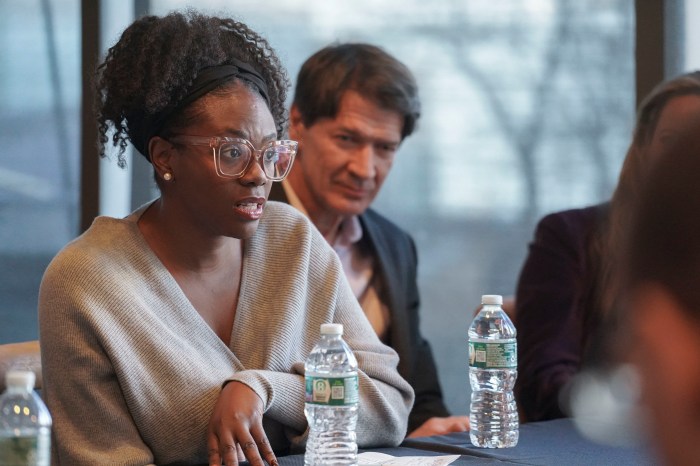By Arlene McKanic
The problem begins when Willie, played with beautiful comic timing by Black Spectrum veteran Fulton Hodges, becomes enamored of the teachings of Kweli (Sean Turner), who runs a center for African heritage and culture near Willie's home. Now, while there's nothing wrong with African Americans learning about African culture, the keystone of Kweli's teaching is his thoroughgoing belief in polygamy. Indeed, he believes in it so much that he's taken on three wives, one of whom is hugely pregnant, with the other two no doubt waiting their turn. Willie, who's been seeing the airheaded Shirley on the side anyway, decides he's going to follow Kweli's lead and make her his second wife. No, he's not going to ditch Irma, whom he still loves, but he assumes she'll get used to the situation, as she will no doubt get used to walking five steps behind him and generally being his servant. Just like the Mrs. Kwelis.Does the reviewer have to tell you that the American-born and -bred Irma doesn't take kindly to the idea of sharing her home and her man with a flibbertigibbet who's changed her name to the barely pronounceable Nwanyeruwa? Of course not. And Irma will use every strategy available to her to get the stupid girl out of her house. Thyais Walsh gives a wonderful performance as the put-upon wife, who is by turns furious, incredulous, appalled and, finally, very clever indeed. Val T (formerly Valerie Tekosky) is also very funny as Clytie, Irma's rambunctious, wildly dressed mother, and it's a credit to Dana Rainey's acting chops that Nwanyeruwa is almost likeable. Rainey's second wife is not at all a home-wrecker – she really believes that by joining Willie's marriage she is building up the black family. After all, she was either going to marry him or go around the world saving the whales. The scene where she meditates to whale love songs has to be seen to be believed.Turner is engaging as Kweli, whose belief in polygamy and absolute male dominance stems not so much from an embrace of African tradition as it does from his more universal desire to have several women at his beck and call. Phylicia Powell, Shaunta Macklin and Uhura Hawkins are excellent as the three wives who believe in him unquestioningly. It's also good that the women are neither written nor performed as doormats – one of them, after all, is allowed to take karate classes, and all are ever ready to raise their fists in the black power salute. Rounding out the cast is Rommell Sermons' suave Emile, from the French West Indies, who figures most prominently in Irma's plan to get her husband back.Bette Howard directs with verve and good humor, and Jay Johnson's lighting design is surprisingly subtle and layered in some scenes, as when Irma and Willie go to separate ends of the stage and think out loud about their problem. The sound design is also spot on, with scenes bookended by appropriate music by folks like Teddy Pendergrass and LTD. The play itself begins with an exhilarating procession of African drums and dancing. June Terry's African-inspired costumes are simply gorgeous and Ajene Washington's design of Irma and Willie's living room and kitchen, with the well-stocked wet bar, cushy furniture and vases of flowers, says much about the struggle for American middle-class respectability, though I must say the door to their fridge was so sticky I was scared it would fall off.”Once in a Wifetime” pokes gentle fun at the desire some American black folks have to embrace the totality of African experience while still enjoying the comforts of home, but it's wise and good-hearted. It'll be at the Black Spectrum till March 30.If You Go'Once in a Wifetime' – A play by Celeste Bedford-WalkerDate: Through March 30 Time: Fridays & Saturdays at 8 p.m., Sundays at 4 p.m.Location: Black Spectrum Theatre, Roy Wilkins Park, 177th Street and Baisley Boulevard, JamaicaCost: $20-$35; Romatic Saturdays: $50 (includes dinner, wine and tickets for two)For More: 718-723-1800 or www.blackspectrum.com for tickets


































